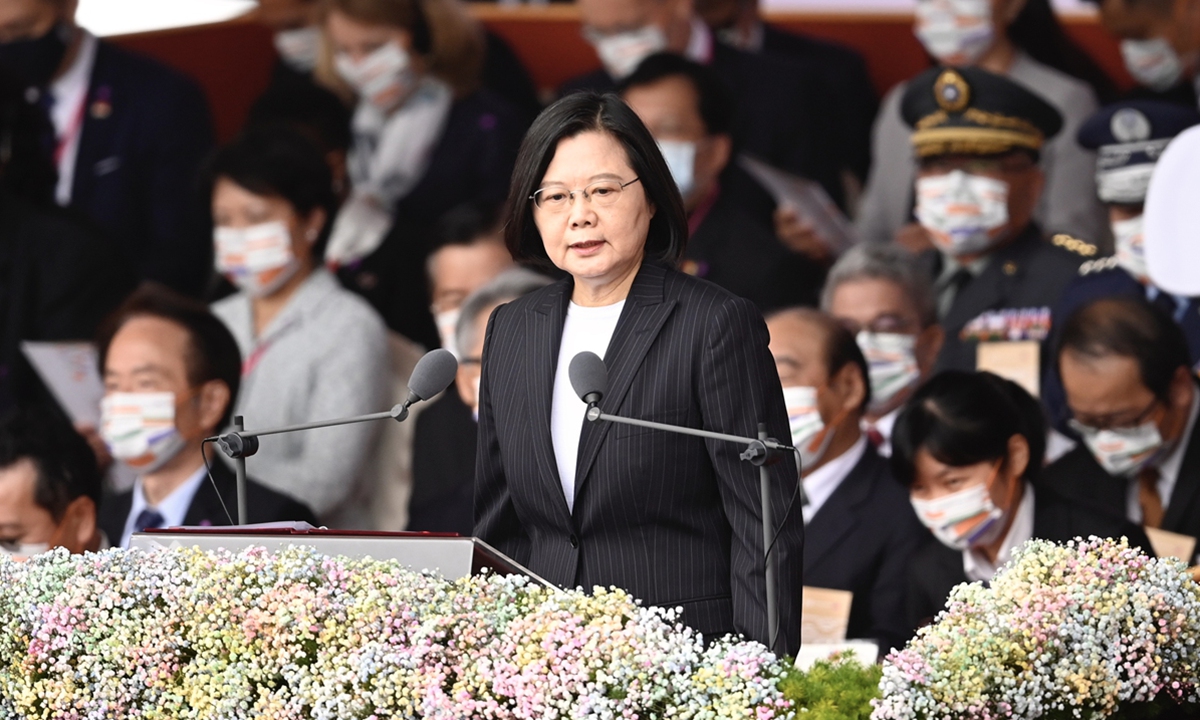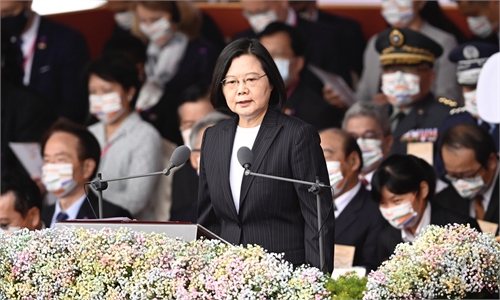DPP authorities conclude reshuffle but factional struggle starts again as 2024 regional election looms

Taiwan regional leader Tsai Ing-wen File Photo: AFP
Chen Chien-jen, a close ally and friend of Taiwan's regional leader Tsai Ing-wen, officially became head of the region's executive body in a handover ceremony on January 31, replacing Su Tseng-chang. The 2024 election to become regional leader is already starting to heat up between different factions within the Democratic Progressive Party (DPP).
A total of 29 DPP officials retained in the reshuffle, with only nine newly appointed, and six out of the above nine had previously served in Su's "cabinet."
Regarding the reshuffle, experts said that the most obvious feature is the "factional co-governance and balance" within the DPP. Moreover, internal strife will continue in the DPP, but an unscrupulous power struggle will only harm Taiwan people, as they care more about their livelihoods.
There are three major factions in the DPP: the "New Tide" faction, the largest faction within the party led by DPP's party chief Lai Ching-te; Tsai's faction which includes Chen and Mayor of Kaohsiung Chen Chi-mai; and "Taiwan Normal Country Promotion Association" faction, led by the island's legislative body leader You Si-kun.
There are also smaller factions, such as the Su faction, led by Su Tseng-chang, and "Taiwan Forward" faction, led by pro-secession media tycoon Lin Kun-hai.
Taiwan-based media described the latest reshuffle in top executive body as "all factions get their candies." Chen from Tsai's camp was appointed as executive head, his deputy is Cheng Wen-tsan from the "New Tide," while Lin Yu-chang from "Taiwan Forward" was appointed as interior affairs chief. Politicians from smaller DPP factions also found their seats.
Analysts said that the DPP has been "governed by factions," with various groups forming alliances to "share the cake." When the Tsai faction was still weak before the 2016 regional election, it chose to form an alliance with the "Taiwan Forward," the second largest faction in the party at that time.
Chiu Yi, a former "lawmaker" in Taiwan and a Taiwan-based pro-reunification scholar, told the Global Times on Wednesday that there are still two small groups within the "New Tide," the southern one was led by Lai while the northern one was represented by Cheng, who is closer to Tsai.
And Tsai also coopted Cheng to counterbalance Lai, trying to divide the "New Tide," he added.
Wang Jianmin, a senior cross-Straits expert at Minnan Normal University in Fujian Province, said that factional struggle is DPP's tradition, which is crucial to the distribution of power and benefits. Therefore, although the DPP agreed to dissolve factions in 2006, it did not fundamentally change the reality of the development of factions.
In Taiwan's regional "legislative body" in 2020, only six of the 61 DPP "lawmakers" have no factional background. The "New Tide" is the biggest winner with 18 "lawmakers," followed by 14 from Tsai's camp and nine from "Taiwan Normal Country Promotion Association."
Attack and revenge
The fight within the DPP for a bigger slice of the pie is even fiercer than facing other parties.
Wang recalled to the Global Times how Su and Frank Hsieh fought for the nomination to represent DPP in regional leadership race. He said that in addition to political attacks, the two men exchanged insults fiercely to a degree that were "never seen before," even worse than smearing their enemies.
In the 2019 DPP primary election for regional leadership nomination, the Tsai's camp smeared Lai of the "New Tide," and manipulated follow-up public opinion polls.
Lai retaliated by purging Tsai's advisers Hung Yao-fu, the former secretary-general of DPP, as soon as Lai became DPP's new party chief.
"This is the beginning of Lai's revenge," Chiu said, noting that Tsai has the "administrative machinery" and control of the intelligence unit, which allows her faction to collect disgraceful evidence of political opponents for the media and use tax investigations to deter paymasters from backing Lai financially in election campaign, which is also a common tactic.
An unscrupulous power struggle will only make the people of the island disillusioned with the DPP and abandon it, as it only goes for political gains rather than people's livelihoods, Wang said.
According to a report from Taiwan-based media udn.com that "factional co-governance" has always been a politer term, and its essence is not much different from "sharing spoils." Regarding to the new list of "cabinet members," it is nothing more than appeasing different factions through resource allocation, with the subtext that "no one is allowed to be rebellious."
Since the defeat in the local election in November 2022, DPP has been in a state of crisis, with factions competing for resources and the slightest mistake will break the factional balance. Tsai's apparent balanced layout may trigger even worse imbalance, thus affecting DPP's election in 2024.
Some analysts, however, said the DPP has a history of factional conflict in surface, but preferring to seek to maintain its advantage as a whole over other parties through "temporary solidarity" after the conflict.
Lai Yueh-chien, a Taiwan-based political scholar, told the Global Times that although the "New Tide" is the largest faction in DPP, it will not be like a "winner-takes-all" way. "They always take a big chunk, and they share the spoils," he said.
Power struggle within the DPP is fierce, but people always find a way out, he said. And that's why the opposition party like Kuomintang cannot afford to take the 2024 election lightly.


